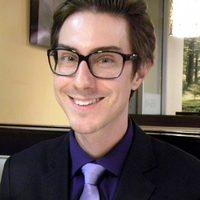
John McDonald began working as an Assistant Teaching Professor of Ancient Mediterranean Studies at the University of Missouri in Fall 2018. He came to Columbia from California, where he spent 2016–2018 as a post-doctoral fellow in Classics and Humanities at San Diego State University. Prior to that, he was a lecturer in Classics at the University of Hawaiʻi at Mānoa during 2015–2016.
In both his teaching and in his research, John contextualizes Greek and Roman verbal and visual culture in a broader Eurasian matrix, with emphases on connections between Greece and Rome on the one hand and India, Iran, Mesopotamia and Ireland on the other. He is characteristically extra-, even anti-canonical in his scope, and aims for kaleidoscopic variety and for unconventional perspectives when guiding students and when doing research. Among the topics that he revisits and scrutinizes in the classroom and in his scholarship are cultural and sub/counter-cultural innovators, outcasts, and iconoclasts (satyrs and fauns, medizers, Daedalus and craftsmen, Orpheus and mystagogues), sinister and hypersexualized goddesses, women, and female monsters (Helen, Aphrodite, the dawn goddess Eos, Circe, the Sirens, courtesans and prostitutes), foreigners and immigrants (Iranians, Celts, Phoenicians, Syrians, and metics), transgender and intersex people and figures in mythical and religious contexts (Kaineus, Agdistis, Attis and the galloi, Venus Barbata) and 20th-century artists who have brilliantly tapped into and creatively adapted and transformed Classical lore and material culture (Pablo Picasso, Jean Cocteau, Marc Chagall, Vaclav Nijinsky).
The title of John's current major project is Orpheus and the Cow: The Greco-Roman Evolution of an Indo-European Myth. This book, which will be published by Harvard's Center for Hellenic Studies, investigates the enigmatic incorporation of Orpheus into a variety of prominently bovine narratives, and seeks to explain these esoteric combinations by means of diachronic and comparative methods. Crucial for his analysis are the hymns of the Rig Veda, which allude to myths that have emerged from the same hereditary storytelling tradition from which the indigenous myths of the ancient Greeks have been developed.
John is also working toward a second book, Echoes of Troy East and West: The War at the End of Myth in Greece, India, and Ireland. This study will trace the ancestry of the myth of the Trojan War as narrated by Homeric epic, the Cyclic poets, and beyond by juxtaposing it with related narratives fabricated by multiple cultures of Eurasia, especially those of ancient India and of medieval Ireland. The focuses will be on the roles, actions, and experiences of female figures, divine, mortal, and monstrous, and on the conclusion of Odysseus' nostos and his death at the hand of his son Telegonos.
- PhD in Classical Philology, Cornell University (2014)
- M.A. in Classical Languages, University of Georgia (2006)
- B.A. in Classics and Medieval Studies, University of Toronto (2003)
- Indo-European perspectives on Classical myth, literature, and culture
- Reception of the Classics in medieval and modern verbal and visual arts
- Exchange of mythical, literary, and cultural traditions between the Greco-Roman world and the Near East
- Iconography of visual representations of Classical myth
- Roman adaptations and transformations of Greek myth, literature, and culture
- Marginal and marginalized groups and figures in the Greco-Roman world
Summer 2022
- From the Bronze Age to the Byzantine Empire: Study Abroad in Greece (destinations include Athens, Delphi, Macedonia, Meteora, Corfu, Olympia, Sparta, Monemvasia, Mycenae, Epidauros, Corinth, and Crete)
Spring 2022
- Cultural Ancestors of the Greeks and Romans: Roots and Branches of Indo-European Myth and Religion
- Elementary Latin II
- Gods, Heroes, and Monsters: Greek Myth in the Visual Arts (Diversity Intensive)
Fall 2021
- Praise and Abuse: Greek Hymns, Curses, and Kindred Texts (Advanced Greek)
- Versions of Venus: Philosophy, Epic, Fairy Tale, and Cult (Advanced Latin)
- Classical Mythology (Diversity Intensive)
Spring 2021
- Intermediate Greek Readings (Homeric hymn to Aphrodite, Odyssey 5 and 10, and Lucian)
- Reading Latin: Apuleius and Virgil
- Gods, Heroes, and Monsters: Greek Myth in the Visual Arts (Diversity Intensive)
Fall 2020
- Survey of Greek Literature (Advanced Greek)
- Reading Latin: Apuleius and Virgil
- Classical Mythology
Spring 2020
- Intermediate Greek Readings (Iliad 3 and 5; Odyssey 4 and 19)
- Oral Tradition
- The Ancient Novel (Diversity Intensive)
Fall 2019
- Reading Greek: Artaxerxes II and Polyphemus
- Greek Culture
- Honors Tutorial: Odysseys in Translation
- Elementary Latin I
Summer 2019
- From the Bronze Age to the Byzantine Empire: Study Abroad in Greece (destinations included Athens, Crete, Naxos, Mykonos, Delos, Corinth, Mycenae, Epidauros, Olympia, and Delphi)
Spring 2019
- Greek Stylistics (Advanced Greek prose composition)
- The Age of Pericles
- Elementary Latin I
Fall 2018
- Gods, Heroes, and Monsters: Greek Myth in the Visual Arts
- The Ancient Novel
- Classical Mythology
Book:
Orpheus and the Cow: The Greco-Roman Evolution of an Indo-European Myth. Under contract with Harvard's Center for Hellenic Studies; to be distributed by Harvard University Press.
Essays:
- “The Oath of Tyndareus and the Nuptials of Nahid: Equine Elements of Marriage by Choice in Greek and Persian Epic Tradition.” In Hollyfest, the digital Festschrift in celebration of Olga (Holly) Davidson's 66th birthday.
http://www.thehollyfest.org/index.php/john-mcdonald/
- “Building Bulls and Crafting Cows: Narratives of Bovine Fabrication from Iran, Ireland and In-between.” In Erin and Iran: Cultural Encounters between the Irish and the Iranians. Ed. Houchang Chehabi and Grace Neville. Boston: Ilex Foundation and the Center for Hellenic Studies, distributed by Harvard University Press, 2015: 14–35.
https://www.academia.edu/15403737/Building_Bulls_and_Crafting_Cows?source=swp_share
Reviewed in French by Guillaume Oudaer, École Pratique des Hautes Études:
http://nouvellemythologiecomparee.hautetfort.com/archive/2016/03/10/review-h-e-chenabi-et-grace-neville-ed-erin-and-iran-cultur-5772107.html